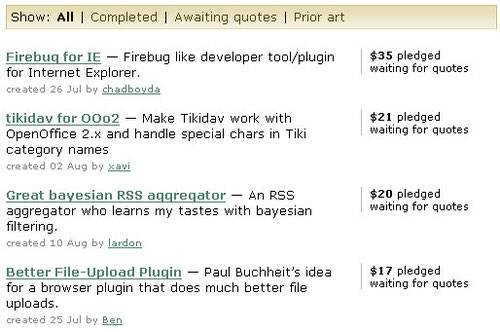The software developement community — especially the open source community — has long used “bounties” to help lure developers to certain tasks. OpensourceExperts.com keeps a bounty list on their site, for example, that displays a number development projects for which people have laid down cash awards to anyone who gets them done. microPledge, a startup from Christchurch, New Zealand, launched today with the aim to organize the process of creating and paying software bounties, and bringing together project funders and developers.

microPledge is an escrow service that allows people to do three things: set up, contribute to and pay out software bounties, accept donations for projects, or set up a fund/bounty for an in house project (as a developer).
I’ll take a look at the idea from the perspective of a project funder. Let’s say you’re a non-coder with a brilliant idea for a piece of software. You have a few options: you could hire someone to make it for you (or trick a friend into doing it for free); you could give your idea out for free and hope that someone decides to make it; or you could go the microPledge route and set up a bounty.

The idea is that if others like your idea as much as you, they’ll also contribute to the bounty and many small pledges will add up to a sizable bounty. The higher the amount offered, the more chances will attract interest from developers. While a project is collecting bounty contributions, developers can submit quotes (target price and time to completion). After a the contribution period is done, the chosen developer begins development over the time estimated.
All pledged money is kept in escrow until a final product is shown and pledgers vote on whether to pay the developer. Developers can also request “progress payments” by showing that they have completed some of the project (these are also voted on by pledgers).
Developers can use microPledge to create “donation-only” projects — which means that instead of acting as an escrow service, the money is deposited directly to the developer working on the software. Or, developers can use microPledge to gather pledges (still kept in escrow) for their own projects — or in other words, projects that no one else is allowed to submit quotes for. microPledge is free for open source projects, but the company takes 3% of pledged money for projects utilizing closed source licenses, and 6% for proprietary licenses.
Right now, all payments are handled by PayPal, but microPledge is considering other options. The company is also considering branching out beyond software development, so people could use microPledge to fund things like events.





















